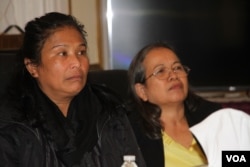In late November, Lim Morn traveled to Washington, her first trip outside Minnesota since resettling there as a Cambodian immigrant in 1986.
She made the trek to plead for the release of her son, Chheng Soeun, after he was detained in August by agents of U.S. Immigration and Customs Enforcement (ICE). Chheng was marked for deportation because of a criminal record.
"I asked that they keep my son in the country because … we have no relatives in Cambodia," Lim, a single mother of four, told VOA Khmer.
Chheng is one of eight Cambodian men who face deportation at any time after Cambodia issues the appropriate travel documents. Shawn Neudauer, the public affairs officer in Minnesota for the Department of Homeland Security and ICE, told VOA by email that ICE does not have any leeway in the cases.
"The eight Cambodian men in Minnesota, currently in ICE custody while awaiting removal to their birth country, all have serious criminal conviction records, and each has a Final Order of Removal issued by the immigration courts," he said. "ICE must carry out these court orders in as timely a manner as possible. ICE does not have the discretion to ignore the court orders."
However, Chheng's lawyer suspects authorities have become more aggressive since President Donald Trump took office on a platform that called for much tougher treatment of refugees and immigrants with criminal records.
"The change in administration has signaled a willingness to deport people with criminal records and not exercise any discretion at all," said Danielle Robinson Briand, who represents Chheng and the others.
Last week, Gen. Khieu Sopheak, the spokesman for Cambodia's Ministry of the Interior, said the government had agreed to receive 36 Cambodians from the U.S. It is not known if the eight men from Minnesota are covered by the agreement.
Child refugees
The Cambodian-American men, known collectively by supporters as the "Minnesota 8," all arrived in the United States as child refugees. Each man had been convicted of a crime and served his sentence before being detained by ICE.
Their repatriation is covered by the 2002 U.S.-Cambodian Joint Commission on Repatriation (JCR). The commission is an outgrowth of the 1996 Antiterrorism and Effective Death Penalty Act, federal legislation that expanded deportation criteria.
Although the U.S. law was passed in 1996, Washington had to negotiate deportation agreements with individual nations; Cambodia signed in 2002.
In Washington, Lin attended an informal meeting hosted by the Cambodian Embassy about the JCR. Comprising four Americans and four Cambodians who review individual deportation cases, the JCR was established as part of the 2002 agreement. JCR officials typically do not meet with family members.
The Minnesota 8 cases have sparked protests since the detentions. An open letter to the U.S. secretary of Homeland Security, signed by three members of Congress, condemned the use of the 1996 law to justify the Minnesota roundup.
Each of the eight men is the breadwinner for his family. None has immediate family in Cambodia. They barely speak Khmer, the primary language of Cambodia.
Chheng, convicted of a gang-related murder in 1995 when he was 14, served 17 years in state prison. Since his early release for good behavior in 2012, he has worked as a barber and avoided further criminal activities, Briand said.
A counterterrorism measure
But under the 1996 legislation, permanent U.S. residents who aren't naturalized citizens and who have been convicted of crimes on U.S. soil, including some misdemeanors, can be detained without appeal, even if they have served their sentences in full. At the signing ceremony, then-President Bill Clinton said the legislation "strikes a mighty blow" against terrorism.
Critics say the law is based on what they call intentionally vague definitions of "moral turpitude" and a broadened index of crimes that can get permanent residents deported.
"The aggravated felony [clause, according to the 1996 provisions,] really does have a too-harsh effect," said Hiroshi Motomura, a University of California-Los Angeles School of Law professor who is an immigration and citizenship expert. "Not only does it expand the scope of deportation, but it also limits the ability of immigration judges to allow people to stay in the United States based on their individual circumstances."
Broadened in the wake of the Sept. 11, 2001, attacks, the law's counterterror and immigration provisions have resulted in more than 500 deportations to Cambodia since 2002, according to the Returnee Integration Support Center in Cambodia.
U.S. Rep. Keith Ellison, a Democrat from Minnesota, represents the district in which Chheng's family lives, and has said the law needs "more flexibility in it. It needs to include mitigating circumstances."
Such circumstances could include whether a person slated for deportation had ever been to the country to which he was being sent, Ellison said.
Damaged families
Born in Thailand's Khao-I-Dang refugee camp in 1981, Chheng is one of many Cambodians who have never lived in their country of origin. Displaced by the Khmer Rouge genocide, which emerged from the political upheaval triggered in part by U.S. bombing campaigns of the Vietnam-war era, his family was granted U.S. refuge when he was a preschooler.
As VOA has previously reported, many Cambodians who survived the Khmer Rouge regime suffer from post-traumatic stress disorder. This has complicated their integration into American life.
"War and genocide had caused so much damage to the families," Chum Bun Rong, Cambodia's ambassador to the United States, told VOA. "They continued to struggle on [U.S.] soil, and dealing with trauma might cause people to commit crimes."
In late October, Cambodia's Ministry of Foreign Affairs asked U.S. Embassy officials in Phnom Penh to temporarily suspend the 2002 repatriation agreement in an attempt to amend it.
David Josar, the U.S. Embassy's deputy spokesman, explained the U.S. response in an email to VOA's Khmer service: "We continue to work with the Government of Cambodia on repatriations of its citizens," he wrote. "We believe Cambodia should issue travel documents to its citizens and accept the return of those subject to final orders of removal."
The Cambodia Daily newspaper has quoted Chum Sounry, spokesman for Cambodia's Ministry of Foreign Affairs, saying his country has created "a working group" on the agreement with a U.S. counterpart. Sopheak of the Interior Ministry told VOA a draft proposal will be presented to the U.S. once it is completed.
Am Sam Ath, monitoring manager at rights group Licadho in Phnom Penh, said this week that Cambodians who have never lived in their homeland and who are deported from the U.S. will find it hard to adapt to their new surroundings and will require support.
"This is very necessary," he said. "This is what the governments have to discuss and the U.S. is a country that implements democracy. Thus, they must understand rights and freedom of the people."









